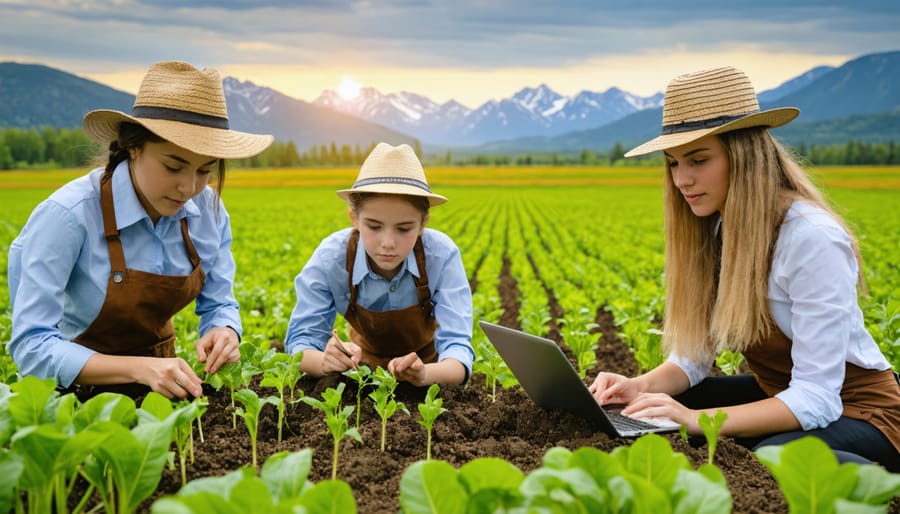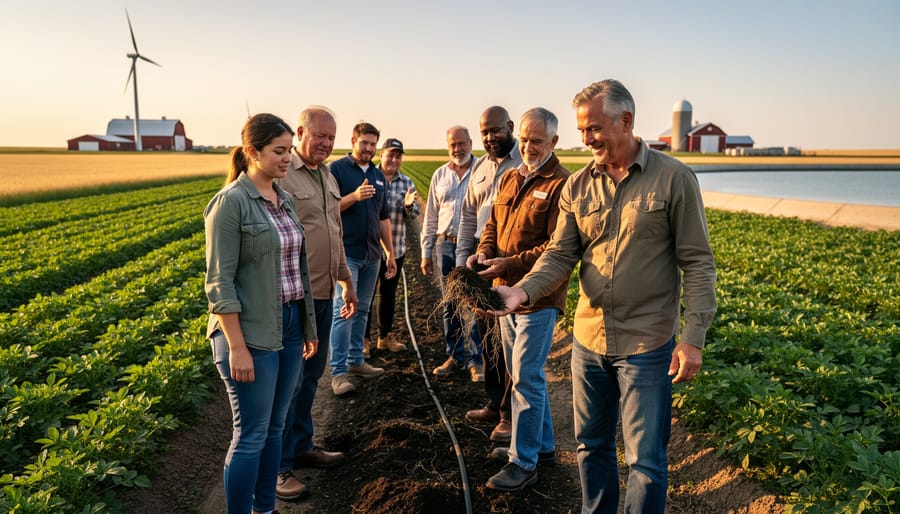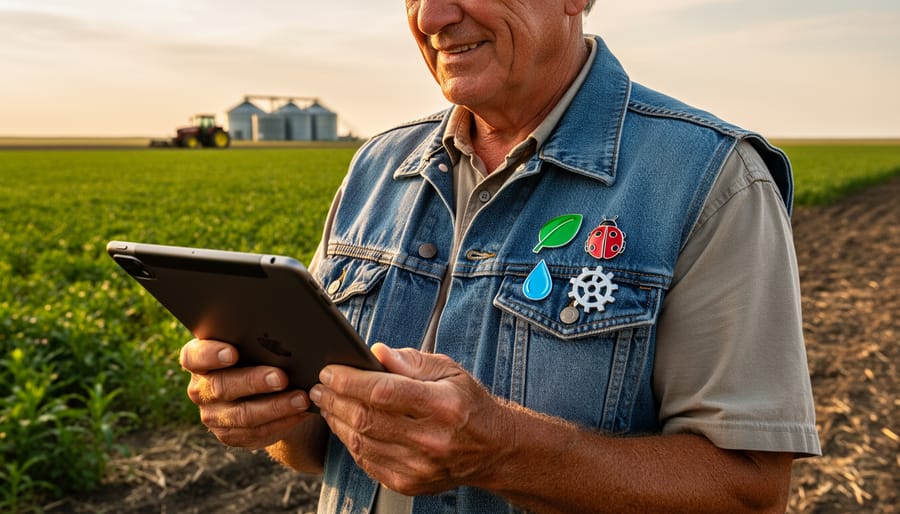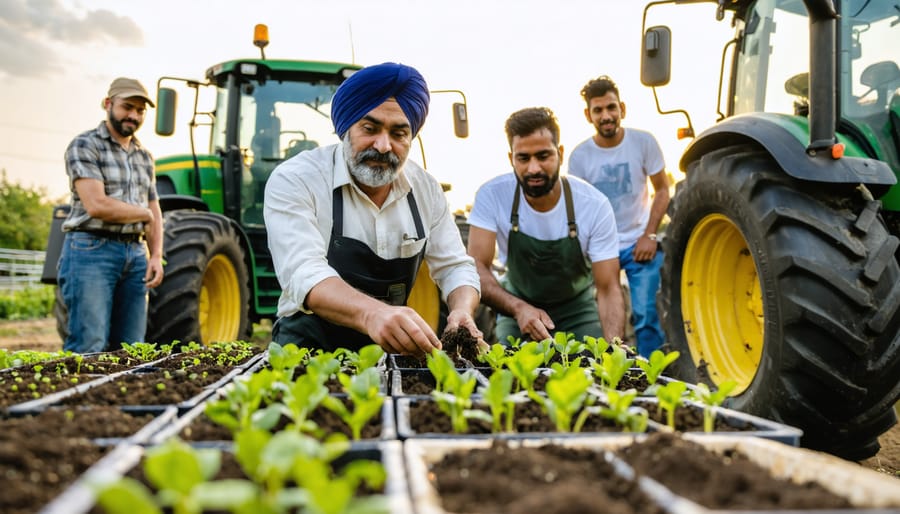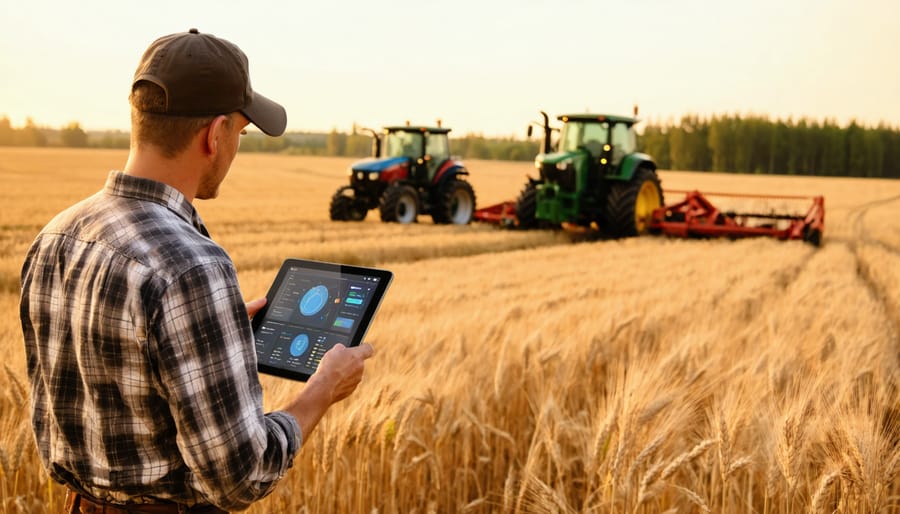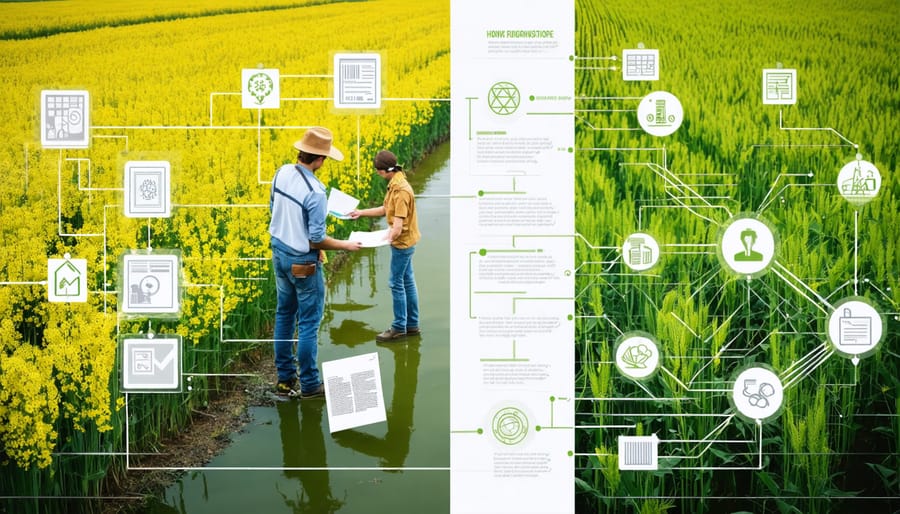Agricultural education empowers farmers and rural communities through systematic knowledge transfer, hands-on training, and research-based practices that build tomorrow’s sustainable farmers in Alberta and across Canada. This comprehensive learning approach combines classroom instruction, practical field experience, and technological innovation to develop skilled agricultural professionals who can meet modern farming challenges.
Modern agricultural education extends far beyond traditional farming methods, encompassing business management, environmental stewardship, and digital technology integration. It prepares practitioners to navigate complex challenges like climate change adaptation, market volatility, and sustainable resource management while maintaining profitable operations.
Students gain expertise in crop science, livestock management, soil health, precision agriculture, and farm economics through structured programs at colleges, universities, and extension services. This knowledge-based approach creates resilient farming communities equipped to adopt innovative practices, implement conservation strategies, and contribute to Canada’s food security while preserving agricultural heritage for future generations.
By combining scientific principles with practical applications, agricultural education serves as the foundation for developing competent producers who can balance productivity with environmental responsibility, ensuring the long-term viability of Canadian agriculture.
What Modern Agricultural Education Really Means
Beyond Traditional Classroom Learning
Modern agricultural education has evolved far beyond traditional classroom settings, embracing diverse learning formats that cater to the varied needs of today’s farmers. Online courses and webinars have become increasingly popular, allowing producers to access expert knowledge from their farms. The integration of digital technology in agriculture has revolutionized learning opportunities, making education more accessible and practical.
Hands-on learning remains crucial, with demonstration farms and field days providing invaluable experiential education. Many Alberta producers participate in peer-to-peer learning networks, sharing knowledge and best practices through organized farm tours and discussion groups. Mobile learning apps and podcasts offer flexibility for busy farmers to learn while working, while mentorship programs connect experienced producers with those seeking guidance.
Virtual reality simulations are emerging as powerful tools for equipment training and crop management scenarios, allowing farmers to practice new techniques safely before implementing them in the field. These diverse learning approaches ensure that agricultural education remains relevant, practical, and adaptable to the changing needs of Canadian agriculture.

The Alberta Advantage
Alberta’s unique agricultural landscape offers distinctive advantages for agricultural education, combining traditional farming wisdom with cutting-edge research and technology. The province’s diverse growing conditions, from prairie grasslands to foothills, provide students with hands-on experience across various agricultural environments.
The University of Alberta and Olds College lead the way with specialized programs that leverage the region’s agricultural strengths. Students benefit from access to over 50 million acres of farmland and connections with more than 40,000 farm operators across the province. This vast network creates unparalleled opportunities for practical learning and mentorship.
Alberta’s agricultural education programs particularly excel in sustainable farming practices, crop science, and livestock management. The province’s strong focus on innovation is evident through initiatives like the Smart Farm at Olds College and the University of Alberta’s research stations, where students can experiment with precision agriculture technologies.
Local agricultural societies and 4-H clubs further enhance learning opportunities, creating a comprehensive educational ecosystem that supports both new farmers and experienced producers seeking to expand their knowledge.
Core Components of Effective Agricultural Education
Hands-on Experience
Practical experience forms the cornerstone of effective agricultural education, where students learn by doing rather than just observing. Through structured hands-on learning activities, Alberta’s agricultural students gain invaluable skills in real farm settings.
Field work typically includes soil testing, crop management, livestock handling, and equipment operation. Students work alongside experienced farmers, participating in seasonal activities from seeding to harvest. These practical sessions often take place at demonstration farms, research stations, and partner farms across Alberta, where learners can experience diverse agricultural operations firsthand.
The hands-on component extends beyond traditional farming practices to include modern technologies like GPS-guided equipment, drone operation for crop monitoring, and automated irrigation systems. This practical exposure helps students develop confidence and competence in both traditional and contemporary farming methods.
Many programs incorporate work placements or internships with local farms, giving students the opportunity to apply their knowledge in real-world situations while building valuable connections within the agricultural community. This experiential learning approach ensures graduates are well-prepared for the practical challenges of modern farming.
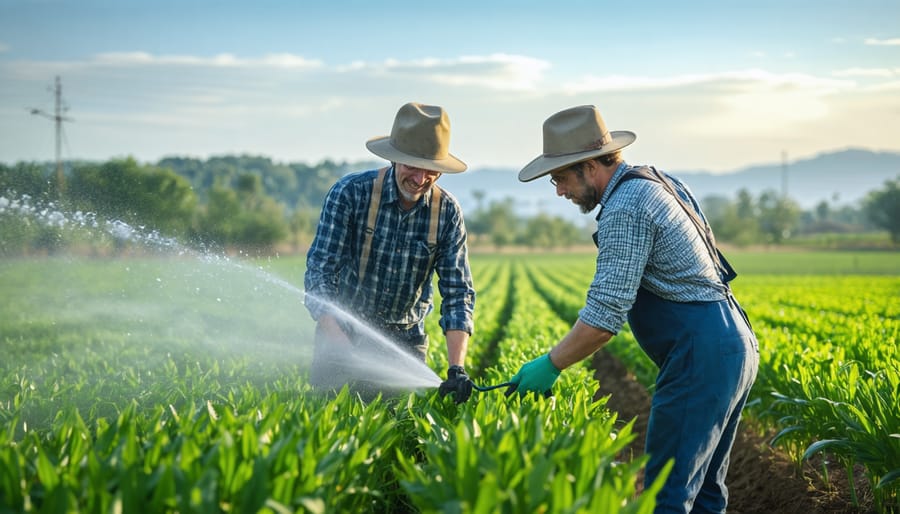
Sustainable Practices Training
Sustainable practices training forms a cornerstone of modern agricultural education, equipping farmers with essential knowledge to reduce their environmental impact while maintaining productive operations. In Alberta, this training emphasizes practical techniques for carbon reduction and soil health management, including precision agriculture methods that optimize resource use.
Students learn about crop rotation strategies, integrated pest management, and water conservation techniques specific to prairie conditions. Through hands-on experience at demonstration farms, participants observe how cover cropping and minimal tillage practices enhance soil organic matter while reducing greenhouse gas emissions.
Local success stories, like the Mackenzie County Carbon Offset Project, showcase how Alberta farmers implement sustainable practices while maintaining profitable operations. Training programs often feature experienced producers sharing their transition to regenerative agriculture methods, providing real-world context and practical implementation strategies.
The curriculum typically includes modules on renewable energy integration, waste reduction, and biodiversity enhancement. Participants learn to conduct environmental impact assessments and develop sustainability plans tailored to their operations. Special attention is given to indigenous land management practices and traditional ecological knowledge, acknowledging their vital role in sustainable agriculture.
Through certification programs and ongoing education, farmers gain the tools needed to become environmental stewards while building resilient agricultural businesses for future generations.
Business Management Skills
Modern agricultural education places significant emphasis on business management skills, recognizing that successful farming requires both field expertise and sound business acumen. In Alberta’s agricultural landscape, farmers must understand financial planning, market analysis, and operational efficiency to maintain competitive and sustainable operations.
Key aspects include budget management, where farmers learn to track expenses, forecast revenues, and maintain healthy cash flow throughout seasonal cycles. Risk management education helps producers navigate challenges like weather uncertainties and market fluctuations through tools such as crop insurance and futures contracts.
Marketing skills development enables farmers to identify market opportunities, establish strong relationships with buyers, and develop effective pricing strategies. Digital literacy training ensures farmers can utilize modern farm management software, accounting systems, and online marketing platforms effectively.
Through hands-on workshops and mentorship programs across Alberta, farmers learn to create comprehensive business plans, understand agricultural lending processes, and make informed decisions about equipment investments and land acquisitions. Industry experts often share real-world experiences, helping farmers develop practical strategies for business growth and succession planning.
These business management components are essential for transforming traditional farming operations into professionally managed agricultural enterprises that can thrive in today’s competitive marketplace while maintaining sustainable practices.
Real Impact: Success Stories from Alberta Farms
The Smith Family’s Soil Revolution
The Smith family’s journey to agricultural excellence began in 2018 on their 400-hectare farm near Lethbridge, Alberta. After three generations of conventional farming, Sarah and Mike Smith decided to revolutionize their approach by implementing comprehensive soil health practices learned through their participation in local agricultural education programs.
Working closely with agricultural extension specialists, the Smiths developed a five-year plan focusing on crop rotation, cover cropping, and reduced tillage. They attended workshops at the Lethbridge Research Centre and participated in peer-learning groups with neighboring farmers, sharing knowledge and experiences.
The results were transformative. Within three years, their soil organic matter increased by 2%, water retention improved significantly, and they reduced synthetic fertilizer use by 40%. Their wheat yields increased by 15%, while production costs decreased by 25%.
The Smiths now host regular field days, welcoming other Alberta farmers to learn from their experience. “Education wasn’t just about attending classes,” Sarah explains. “It was about building a community of knowledge-sharing farmers who support each other’s growth.”
Their success story demonstrates how agricultural education can bridge the gap between traditional farming methods and modern sustainable practices, creating lasting positive change for both the environment and farm profitability.
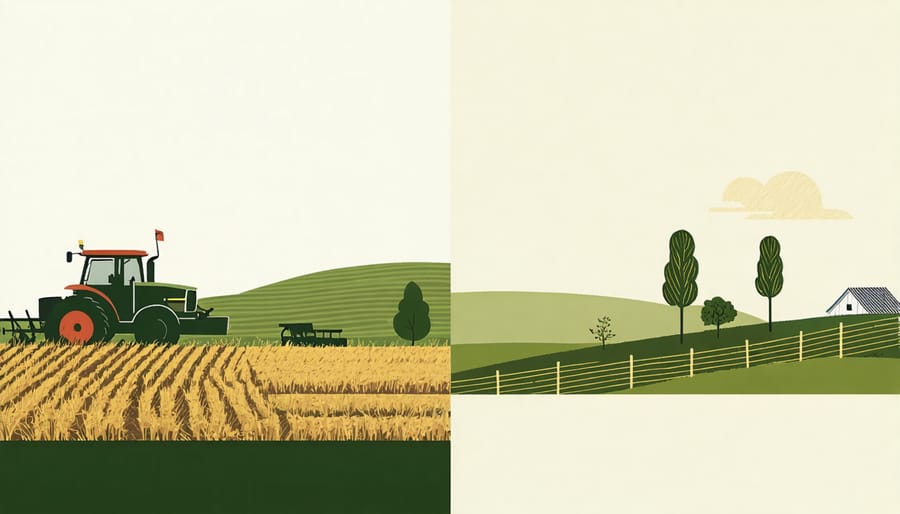
Innovation Through Education
At the Green Acres Learning Farm in Lethbridge, Alberta, farmer Sarah Thompson transformed her traditional grain operation after participating in a sustainable agriculture workshop series. Through hands-on training, she implemented zero-till practices and cover cropping, resulting in a 30% reduction in water usage and improved soil health within two growing seasons.
Similar success stories emerge from the Peace River region, where a group of cattle ranchers adopted rotational grazing techniques learned through the Alberta Sustainable Grazing Initiative. Their newfound knowledge led to better pasture management and increased cattle weight gain by 15% while reducing feed costs.
The Central Alberta Agricultural Society’s mentorship program pairs experienced farmers with newcomers to share generational wisdom alongside modern sustainable practices. Mark Johnson, a third-generation farmer near Red Deer, credits this program for helping him transition 200 hectares to organic production through improved understanding of natural pest management and soil biology.
Digital learning platforms have also made a significant impact. The Virtual Farm School, launched by Agriculture Alberta, connects farmers across the province through online courses and virtual field days. This innovative approach allowed Carlton Valley Farms to implement precision agriculture techniques, reducing fertilizer use by 25% while maintaining yield targets.
These examples demonstrate how continuous agricultural education empowers farmers to adopt sustainable practices while improving their operations’ efficiency and profitability.
Getting Started with Agricultural Education
Available Resources in Alberta
Alberta offers a wealth of agricultural education resources tailored to both new and experienced farmers. Olds College, a leading agricultural institution, provides comprehensive diploma and certificate programs in sustainable agriculture, along with specialized workshops throughout the year. The University of Alberta’s Faculty of Agricultural, Life & Environmental Sciences delivers cutting-edge research opportunities and degree programs focused on modern farming practices.
For hands-on learning, Alberta Agriculture and Forestry hosts regular field schools and demonstration farms across the province. These facilities showcase innovative techniques in crop management, livestock handling, and sustainable farming methods. The Agricultural Research and Extension Council of Alberta (ARECA) coordinates with thirteen member organizations to deliver practical, region-specific training programs.
Local agricultural societies throughout Alberta organize workshops, seminars, and mentorship programs designed to support farming communities. The Farm Safety Centre offers essential safety education and certification programs, while organizations like Young Agrarians Alberta provide networking opportunities and land-matching services for aspiring farmers.
Digital resources include Alberta Farm Fresh School, an online platform offering self-paced courses in direct marketing and farm business management. The Green Certificate Program, available through high schools and colleges, provides apprenticeship-style training in various agricultural specializations.
Many of these programs offer flexible learning options, including evening classes, weekend workshops, and distance learning opportunities, making agricultural education accessible to working farmers and rural communities.
Building Your Learning Path
Creating your personalized agricultural education journey starts with identifying your specific learning goals and current knowledge gaps. Whether you’re aiming to transition to sustainable farming practices or expand your existing operation, begin by conducting a self-assessment of your current skills and areas where you’d like to grow.
Consider combining formal and informal learning opportunities. Many Alberta agricultural colleges offer flexible programs that can accommodate your farming schedule, with options for evening classes and online courses. Look for programs that align with your regional growing conditions and market opportunities.
Network with experienced farmers in your community who can serve as mentors. The Alberta Federation of Agriculture often organizes mentorship programs and study groups where you can learn from peers who have successfully implemented new farming techniques.
Hands-on experience is crucial. Start with small-scale experiments on your farm to apply new knowledge practically. Document your learning through field notes and photographs, creating a personal reference library for future seasons.
Make use of agricultural extension services and workshops offered by local agricultural societies. These resources often provide targeted training in specific areas like soil health management or precision agriculture techniques.
Remember to set realistic timelines for your learning goals, considering your farming calendar and seasonal demands. Review and adjust your learning path regularly, celebrating small wins and remaining flexible as new agricultural innovations emerge.
Agricultural education stands as a cornerstone of innovation and sustainability in Canada’s farming future. Through comprehensive learning programs, hands-on experience, and community engagement, farmers across Alberta and beyond are discovering new pathways to success and environmental stewardship. The transformative power of agricultural education extends far beyond the classroom, creating ripples of positive change throughout our rural communities and food systems.
As we’ve explored throughout this article, agricultural education empowers farmers with the knowledge, skills, and confidence needed to adapt to changing climates, embrace new technologies, and maintain profitable operations while prioritizing sustainability. The success stories from farms across Alberta demonstrate how education has enabled producers to innovate, reduce costs, and build more resilient agricultural businesses.
Now is the time to take action and invest in your agricultural knowledge. Consider enrolling in local farming workshops, joining agricultural associations, or participating in mentorship programs. Many regional agricultural services boards offer free or low-cost educational opportunities throughout the year. Remember that every step toward learning strengthens not only your operation but also contributes to the broader farming community.
Together, we can build a more sustainable and prosperous agricultural sector in Canada. Whether you’re a seasoned farmer looking to diversify your knowledge or someone new to agriculture, educational resources are available to support your journey. Let’s embrace the power of agricultural education to shape a brighter future for Canadian farming.

